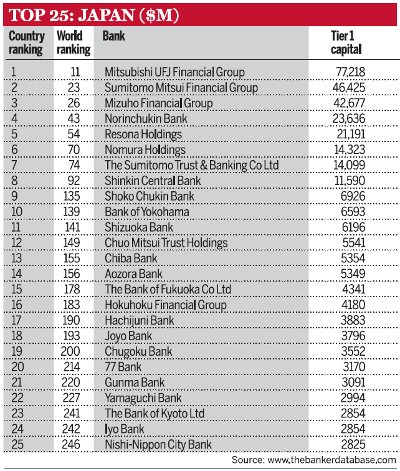Japanese decline continues despite profitable 2009
Despite pulling itself out of the worst recession the country has seen since the Second World War, Japan remains a deeply troubled economy saddled with a fiscal position that has in recent months gone from bad to worse: indeed, so parlous is Japan's predicament that in June the country's new prime minister, Naoto Kan, warned that the once mighty Asian economy may be staring a Greek-style public debt crisis in the face.
Market-watchers believe, however, that the country's banking industry should remain relatively insulated from any sovereign problems - and recent performances have been encouraging. All major Japanese banks have returned to profitability during the 2010 financial year, following an extremely testing 2009 when the vast majority posted net losses.
However, market-watchers remain gloomy on the medium-term prospects of Japan's mega-banks, which are unlikely to explore any repeat large-scale stock issuances of the likes seen last year, owing to subdued industry-wide profits that will not be able to sustain the additional dividend payouts. Retained earnings, notes Fitch Ratings, will provide the primary, although weakened, mechanism by which Japan's heavyweights can hope to strengthen core capitalisation.
As a result, the comparatively positive showing of the Japanese banks in last year's ranking has this year reversed: as such, it is business as usual, with the country's overall position resuming its long-term slide down the Top 1000 World Banks ranking.
Of this year's top 25 Japanese banks, 17 have slipped in the Top 1000 ranking by an average of 10 places, while just seven banks have climbed up the global ranking compared with last year's 12. Perhaps most symbolically, though, Japan's heavy-hitter Mitsubishi UFJ Financial Group (MUFG), which has long been the highest-ranked Asian bank in the Top 1000, has fallen out of the top 10, replaced by China's seemingly unstoppable Industrial and Commercial Bank of China. The displaced MUFG, which remains top dog among the Japanese banks, has slipped four places, now standing at number 11 globally compared with number seven last year and number six in 2008.
Meanwhile, Sumitomo Mitsui Financial Group (SMFG), which in recent years hovered around the number three position in Japan's top 25 list, has this year usurped Mizuho Financial Group (MFG), grabbing the number two spot. But in line with the country's long-term downward trend, SMFG has also lost four places globally, while MFG has hit the average dead-on, slipping 10 places.
Overall, however, Japan's top three mega-banks have this year accelerated their downward trajectory, having slumped a combined 18 places compared with just three in 2009's rankings.
Unsurprisingly, it is the country's smaller banks that have moved up. Spurred on by a chunky 33% growth in its Tier 1 capital, Shoko Chukin Bank moved up three places in its domestic market but gained 14 places overall. Likewise, Sumitomo Trust & Banking Co and Shinkin Central Bank may have slipped in the domestic ranking but, boosted by an average 31% surge in their Tier 1 capital, they have crept up the global ranking, gaining nine and six places, respectively. Both banks can blame their slight decline in this year's domestic ranking on the ambitious Nomura, which is a new entrant to the top 25 Japanese banks after the bank's move to allow Western analysts easier access to its Pillar III calculations.
Tokyo-based Chuo Mitsui Trust Holdings has also returned to the top 25 this year, while Hiroshima Bank, which last year occupied the 24th spot, and Sapporo Hokuyo Holdings, have been pushed out of the top 25 at the hands of this year's two new entrants.
Although analysts do not believe Japan's deteriorating fiscal position will directly affect the country's mega-banks, there is a risk that it may have adverse knock-on effects for the country's export sector and in turn dent loan quality. As such, next year may yet see Japan slide ever further down the global rankings.



